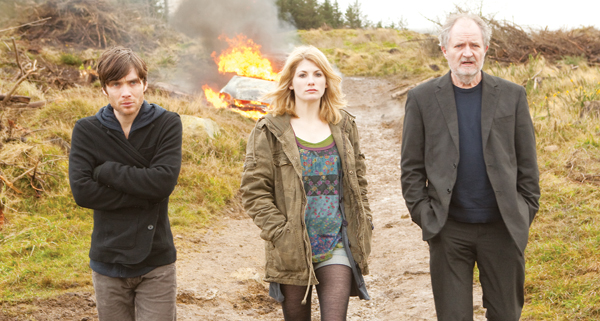Perrier’s Bounty
The best stories, characters, images and ideas persist in the mind when the credits roll, but Perrier’s Bounty meekly expires as the screen fades to black.
Plot summary
A gangster named Perrier looks to exact his revenge on a trio of fugitives responsible for the accidental death of one of his cronies.

The best stories, characters, images and ideas persist in the mind when the credits roll, but Perrier’s Bounty meekly expires as the screen fades to black. As the names of its stellar cast reeled away it was hard not to reflect on where it went wrong. Sparsely scattered moments of quality make it tempting to wonder whether its broad strokes and familiar arcs were signs of deliberate compromise. It has the whiff of something targeted at an international market and in the end, in spite of the talent involved, Perrier’s fizz falls flat.
Cillian Murphy’s Michael wakes up in his grubby Dublin flat to find he has the company of two goons in the employ of Dublin gangster Darren Perrier (Brendan Gleeson). They’ve popped by to call in a debt of €1000 that Michael has four hours to pay. Predictably, the only way to get the money at short notice is to become embroiled in a dodgy scheme himself. Into this scenario step a suicidal neighbour (Jodie Whittaker), an estranged father (Jim Broadbent), and an unfortunate incident with a borrowed gun. With a bounty on their heads Michael, neighbour Brenda and dad Jim head for the hills. If Michael was enough of an idler to think loan sharks were a good idea then it seems unlikely he’ll have the wit to elude a network of Dublin thugs.
A well=earned faith in the main players means the first act feels promising. This is reinforced by strong dialogue that shifts between well observed naturalism, theatrical patter and some nicely daft grandiloquence. After a while though, each one of our fugitive trio begins to look miscast. That is some feat considering the acting chops on show. Cillian Murphy is in tune with Michael’s voice but is never stretched; such a talented performer can only do so much with a thinly sketched character. Jodie Whittaker is a great screen presence but Brenda is similarly underdeveloped. The biggest conundrum though is Jim Broadbent’s Jim. For such a brilliantly accomplished actor, his wobbly Dublin brogue was undignified. His character is supposed to be a shambles but my running concern (“Jim, what are you doing… you look tired… scrub up and have a shave, Jim”) might have been for the Jim who was pretending to be Irish.
Redemption comes in the shape of Brendan Gleeson. His portrayal of a Dublin mob boss is brilliant. As the titular Perrier, his character is a haunting presence from the opening scene and his belated arrival alone is reason enough to see the film. As a brute who aspires to spiritual or intellectual depth he is cut from a familiar template, but in Gleeson’s hands that juxtaposition feels fresh. His mix of ruthlessness and reflection is the heart of the movie but it makes the rest seem slightly off-key and underdone. Perrier is the most fully developed character and Gleeson magnifies that to become the only role that properly occupies and makes sense of the cartoonishly real world they’re in.
‘Cartoon naturalism’ is actually a phrase used by writer Mark O’Rowe to describe this version of Dublin and the film’s heightened action. It’s an unforgiving naturalism. The men are different flavours of criminal who enjoy snooker and training dangerous dogs and the women are young and game or old, mentally ill and confined to a farm. I kept an eye out in the credits for Tourism Ireland. If this purports to give any insight into Dublin’s underbelly then it sits alongside Richard Curtis’ gritty exposés of the London middle class.
The film’s best moments come in flashes of dialogue that take gently amusing scenes and prod you into belly laughs. Perrier, unsurprisingly, makes the most memorable contributions. With the mind of a sophist, he has a nicely stumbled philosophy on modern love and at one point suggests that the looting of cocaine from a freshly dead dealer would be noble and redemptive. Any comic energy though isn’t sustained. The frequent collision of verbosity and vernacular is done with some style but isn’t nearly as clever or original as this film seems to think. Lock, Stock and Snatch did the same thing a while ago and in a very similar setting. You might want to broaden your frames of reference if Guy Ritchie circa 2000 is a touchstone of innovation.
The engaging lilt of conversation almost disguises the fact that the script is also Perrier’s Bounty’s downfall. Both theatrical and prosaic, more subtle handling was needed to avoid an uneven tone as it becomes really tricky for things to stitch together. That the score, by an award winning producer, feels clichéd and stuck on is a sure symptom of this problem. Structurally it is too conventional, its conclusion too predictable and the initially interesting variety of registers never really strikes a balance. An omniscient, enigmatic voice-over tries to unite different strands but it doesn’t quite wash and the sub-plots feel contrived. Michael’s relationship with Jim, the romantic aspect of the tale and the final scene’s attempted ellipsis are all strangely disaffecting. There’s a likable plainness in some crucial moments but no sense of climax is ever achieved as the groundwork for emotional pay-offs just isn’t done. Ultimately, some fine, laugh-out-loud moments are superficial gilding for a flawed work that, while often enjoyable, is decidedly lightweight.











COMMENTS